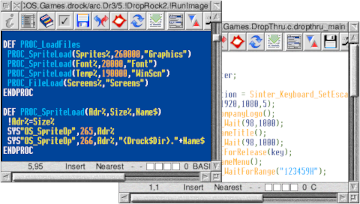Start singing programming for your supper Pi
David Feugey, who hosts and serves up the French language website RISCOS.fr using a Raspberry Pi, has announced the site’s first programming contest – to write something in BBC BASIC, the programming language that is included in the ROM image of all versions of RISC OS, as well as Arthur (ostensibly RISC OS 1) and the ROMs of Acorn’s older 8-bit computers, going all the way back to the very first BBC computer.
The winner of the contest will receive a ‘fully equipped’ Raspberry Pi Model B+ running RISC OS, worth approximately 129 euros, for which David stipulates there is no cash alternative, nor any option for a different computer.
The competition runs until the end of May, with the winner to be selected during June, and the goal is to develop a new piece of software (so not an update to something old nor, presumably, a port from elsewhere), in BBC BASIC, specifically for RISC OS 5. The resulting program can either be a command line program, or a multitasking application that runs in the desktop – and there are no categorical limitations; it can be a tool, a game, a demo, a screensaver… whatever.
To be accepted, David says, the program must be written in pure BBC BASIC, though he does clarify that system calls such as SWI and VDU are acceptable – in fact, the use of SWI would be vital to the development of a multitasking desktop application, which has been given as an example of something that could be written for this task. Also acceptable is the use of “common modules” – by which (and the use of the word ‘pure’ before BBC BASIC) I’d guess David means entrants can make use of existing third party modules, but mustn’t ‘cheat’ by writing a chunk of their program as a module (and therefore in another language – which even using the Assembler that comes with BBC BASIC would be doing), then writing a very simple BASIC front end to the module.
The final condition is that the source code must be free for all uses – that is to say it must be placed in the public domain, although that term may not be recognised in law in all territories, so it would be better to state clearly that it can be freely used, copied, distributed and modified. Simpler would be to place it under a suitably permissive non-proprietory, non-viral open source licence – such as the BSD licence. The GNU General Public Licence (GPL) is given by David as an example of a licence that is specifically disallowed due to its incompatibility with other licences.
Contributions can be sent to David by email.


